

Education welfare officer job information. Page Content Education welfare officer Hours37 per weekStarting salary£22,000 + per year Education welfare officers work with schools, pupils and families to support regular school attendance.
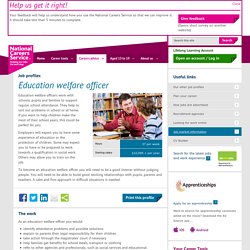
They help to sort out problems in school or at home. If you want to help children make the most of their school years, this could be perfect for you. Employers will expect you to have some experience of education or the protection of children. To become an education welfare officer you will need to be a good listener without judging people. WorkDesc The work As an education welfare officer you would: You would also help the school to check that young people who work outside school hours are doing this within the law.
In some jobs, you may also provide pastoral care to pupils. HoursDesc Hours. Learning mentor: Job description. Learning mentors provide a complementary service to teachers and other staff, addressing the needs of learners who require help in overcoming barriers to learning in order to achieve their full potential.

They work with a range of learners, but give priority to those who need the most help, especially those experiencing multiple disadvantages. The variety of issues covered is vast, ranging from punctuality, absence, challenging behaviour and abuse to working with able and gifted learners who are experiencing difficulties. Learning mentors are predominantly education based (in primary, secondary and further education settings) but have a wider remit including families and the wider community.
Learning Mentor Job Information. Page Content Learning mentor Hours37 per weekStarting salary£14,500 + per year If you enjoy helping people overcome barriers and want to work in education, this could be an ideal job for you.
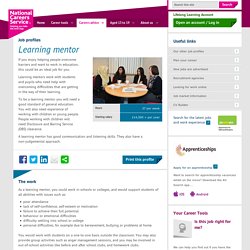
Learning mentors work with students and pupils who need help with overcoming difficulties that are getting in the way of their learning. To be a learning mentor you will need a good standard of general education. A learning mentor has good communication and listening skills. WorkDesc The work As a learning mentor, you could work in schools or colleges, and would support students of all abilities with issues such as: poor attendancelack of self-confidence, self-esteem or motivationfailure to achieve their full potentialbehaviour or emotional difficultiesdifficulty settling into school or collegepersonal difficulties, for example due to bereavement, bullying or problems at home. Ofsted inspector Job Information. Page Content Ofsted inspector HoursVariableStarting salary£64,000 + per year Ofsted is the Office for Standards in Education, Children’s Services and Skills.
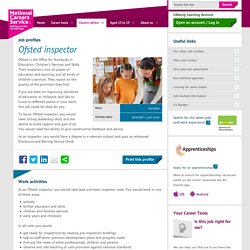
Portage home visitor Job Information. Page Content Portage home visitor Hours36 per weekStarting salary£19,000 + per year Portage home visitors, or portage workers, provide a home-visiting service for pre-school children with developmental or learning difficulties, physical disabilities or other special needs.
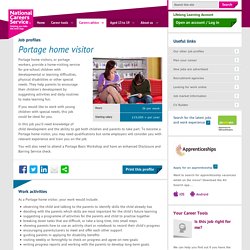
Supporting teaching and learning in schools apprenticeships - Detailed guidance. This apprenticeship trains you to provide support in the classroom.
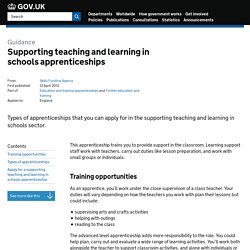
Learning support staff work with teachers, carry out duties like lesson preparation, and work with small groups or individuals. Training opportunities As an apprentice, you’ll work under the close supervision of a class teacher. Your duties will vary depending on how the teachers you work with plan their lessons but could include: Using mentors to improve learning. Apprenticeship standard: further education learning mentor. This document is relevant to: those looking to apply for an apprenticeship employers wanting to recruit an apprentice training organisations working with employers to make the apprenticeships available This standard is not yet ready to use.
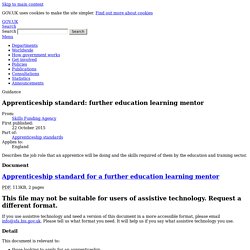
An apprenticeship standard is only available for delivery when both the standard and assessment plan is approved and a funding band (core government contribution) has been assigned to the standard. The new standards will replace all the current apprenticeship frameworks by the academic year 2017 to 2018. Employers involved in creating this standard If you’d like to get involved and contribute to the development of the further education learning mentor standard, please read the guidance for trailblazers, and email the Trailblazer contacts: jo.north@intouchcare.co.uk. Learning mentor - Schools. Learning mentors support, motivate and challenge pupils who are underachieving.
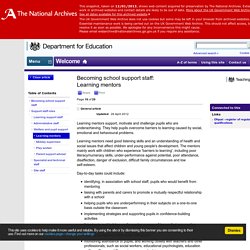
They help pupils overcome barriers to learning caused by social, emotional and behavioural problems. Learning mentors need good listening skills and an understanding of health and social issues that affect children and young people's development. The mentors mainly work with children who experience 'barriers to learning', including poor literacy/numeracy skills, under-performance against potential, poor attendance, disaffection, danger of exclusion, difficult family circumstances and low self-esteem. Home page. Home - ISI - Independent Schools Inspectorate. School Home Support. Welcome to Best Practice Network. Home - CfBT. The national curriculum. The ‘basic’ school curriculum includes the ‘national curriculum’, as well as religious education and sex education.
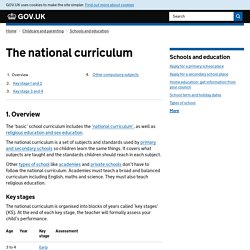
The national curriculum is a set of subjects and standards used by primary and secondary schools so children learn the same things. It covers what subjects are taught and the standards children should reach in each subject. Other types of school like academies and private schools don’t have to follow the national curriculum. Academies must teach a broad and balanced curriculum including English, maths and science. They must also teach religious education. The national curriculum is organised into blocks of years called ‘key stages’ (KS).
Assessments By the end of each summer term the school must write a report on your child’s progress and talk it through with you. The Quality Assurance Agency for Higher Education (QAA) Skip to main navigation Skip to content Accessibility | Text size: A A A | Display: Default / High contrast | Text only Newsroom FAQs Contact us Vacancies Scotland Wales Northern Ireland International safeguarding standards and improving the quality of UK higher education.
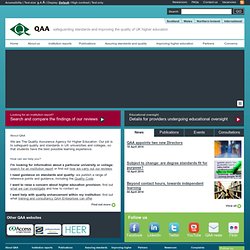
Teaching Times - Imaginative Minds.